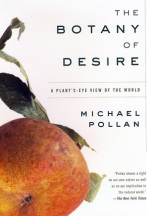Pollan begins with the premise
Design in nature is but a concatenation of accidents, culled by natural selection until the result is so beautiful or effective as to seem a miracle of purpose.He demonstrates how four plants have survived through adaptation, and have ultimately thrived by capitalizing on human desires and needs:
- The Apple - exemplifies our desire for sweetness & intoxication (apple jack),
- The Tulip - exemplifies our desire for beauty,
- Marijuana - exemplifies our desire for pleasure, and
- The Potato - exemplifies our need for sustenance.
Human Desire & Software
Facebook grew from an idea in a Harvard dorm room to over 500 million active users in a hand-full of years (cf. Facebook Timeline). My hunch is that Facebook's popularity is based on its appeal to human behavior and its fulfillment of human desires. That is, by tugging at our narcissism, our curiosity and our instinct to connect with others, Facebook enables us:
- to know what our friends, and would-be friends, are saying & doing,
- to surreptitiously learn more about particular love interests,
- to be flirtatious within a socially removed virtual cocoon, or simply
- to be noticed.
The Botany of Desire reversed my bias about humans domesticating plants like corn or apples or cotton. Perhaps it was the other way around - could it be that the plants domesticated us? Plants have, at the very least, used humans to co-evolve and thrive.
I now think of my killer app as a "species" co-evolving with humans. Future startup software might well have to be every bit as cunning as a Venus Flytrap. Our software must provide the sensory lures, then deliver on needs. Future apps might well be like successful plants -- spawned by and grown by adaptively fulfilling specific human needs in a survival-of-the-fittest environment.
The Lean-Startup approach seems a fitting platform for the evolutionary experimenting that future killer apps might require. Lean-Startup is rooted in the principle of iteratively adapting and refining a business model (i.e., an evolutionary concept), based on proving the viability of features (meeting needs that customers desire).
I
 Not only will killer apps have to provide features and fulfill needs, they will also have to present desire fulfillment in an alluringly positive experience not unlike a flower's nectar lures and intoxicates a honey bee to better serve the flower's ongoing reproductive purpose.
Not only will killer apps have to provide features and fulfill needs, they will also have to present desire fulfillment in an alluringly positive experience not unlike a flower's nectar lures and intoxicates a honey bee to better serve the flower's ongoing reproductive purpose.The UX of Desire means attracting and delivering (...so beautiful and so effective) as if the life of your app depended on it!


No comments:
Post a Comment